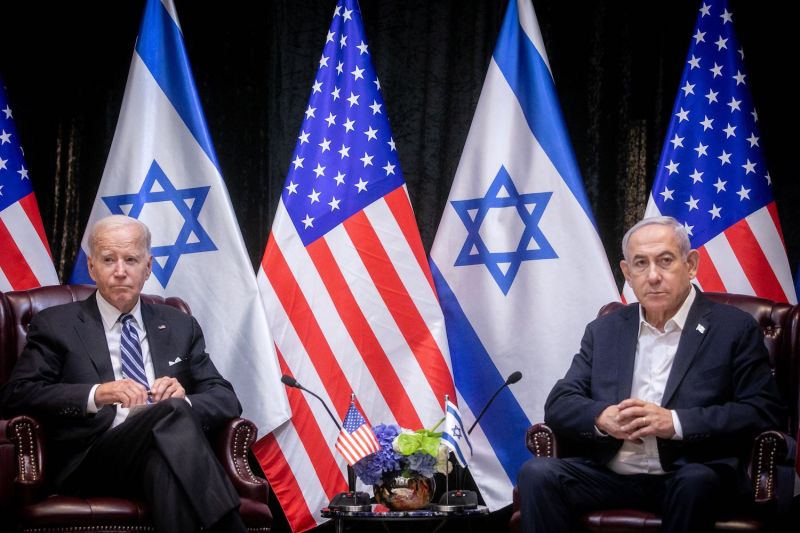The Biden administration unveiled its first-ever sanctions on Israeli settler outposts this week.
Turning Up the Heat
The Biden administration sanctioned two Israeli settler outposts in the West Bank and three Israeli citizens on Thursday, citing violence against Palestinian civilians as the rationale for the latest economic restrictions.
“There is no justification for extremist violence against civilians, whatever their national origin, ethnicity, race, or religion,” the U.S. Department of State said in a statement. “Today’s action further underscores our commitment to promoting peace, security, and stability for civilians in the West Bank and accountability for the individuals and entities involved in these actions.”

The measures represent the first time that the United States has imposed sanctions on settler outposts—not just individual citizens—and come amid a growing divide between U.S. lawmakers and Israeli officials over the direction of the Israel-Hamas war and the worsening humanitarian crisis in the besieged Gaza Strip.
The European Union is reportedly also inching closer to determining sanctions to impose on Israeli settlers in the West Bank, Reuters reported, after Hungary—one of the most vocal opponents of the measures—backed down from its initial resistance.
The same day that the U.S. sanctions were announced, Senate Majority Leader Chuck Schumer delivered his harshest public criticism yet of Israeli Prime Minister Benjamin Netanyahu, identifying him as one of the “major obstacles” to peace and calling for a new elections in a speech on the Senate floor that angered Israeli officials. “A new election is the only way to allow for a healthy and open decision-making process about the future of Israel, at a time when so many Israelis have lost their confidence in the vision and direction of their government,” Schumer said.
Such frank, public criticism of the Israeli leader by Schumer reflects just how much the Israel-Hamas war has shifted views in Washington. “For a Jewish senator from New York, the majority leader, a friend of Netanyahu who’s the most centrist possible Democrat and even leans hawkish on Israel, to voice criticism like this?” said Alon Pinkas, a former Israeli diplomat. “If you’ve lost Chuck Schumer, you’ve lost America.”
President Joe Biden on Friday appeared to back the senator’s comments, calling it a “good speech” that “expressed serious concern shared not only by him, but by many Americans.”
Meanwhile, negotiations for a temporary cease-fire are set to continue. After Hamas proposed a new cease-fire plan, Israel announced on Friday that it would dispatch a delegation of officials to Qatar to participate in a new round of talks, although Israeli officials also called Hamas’s proposals “unrealistic.”
World in Brief
Russian strike in Ukraine. At least 20 people were killed and 70 more were wounded by a Russian missile attack in the Ukrainian Black Sea port city of Odesa, Ukrainian officials said on Friday. The attack was a “double tap,” according to Ukrainian officials, in which Russia launched two strikes—the second of which hit emergency personnel tending to civilians caught in the first attack.
The deadly attack comes days after Ukraine launched drone strikes on oil refineries in Russia and as millions of Russians headed to the polls on Friday to vote in a presidential election that is near certain to extend President Vladimir Putin’s decadeslong reign in power.
Haiti’s spiraling crisis. In the event that Haiti’s worsening political crisis sparks a mass exodus out of the country, the Biden administration is mulling processing the potential influx of migrants at Guantánamo Bay, CNN reported. Separate from the facility’s military prison, which has detained suspected terrorists since 2002, Guantánamo Bay also has a Migrant Operation Center that has previously been used to hold and process migrants.
Meanwhile, observers and officials fear that conditions in Haiti will continue to deteriorate. “It’s an extremely dangerous situation,” Bocchit Edmond, a former Haitian foreign minister who now runs the Haitian Observatory of International Relations think tank, told Foreign Policy’s Robbie Gramer. “Without a change, we are facing a possibility of an entire nation becoming a big open-air jail run by gangs.”
Senegal’s election. Just days ahead of Senegal’s postponed presidential election, authorities have released two opposition leaders from prison: Ousmane Sonko, a top opposition figure who was convicted of “corrupting youth” and remains blocked from running in this election, and Bassirou Diomaye Faye, an ally of Sonko who is running for president. Faye has been campaigning from jail, where he had been held on charges of defamation and contempt of court.
Their release marks the latest twist in a dramatic electoral saga that has raised fears of shrinking freedoms in Senegal after outgoing President Macky Sall pushed to delay the country’s election, originally slated for Feb. 25, by almost 10 months. The election is now scheduled for March 24. Sall has said that he will not run again, having already served two terms.
Excerpts: Foreign Policy




COMMENTS